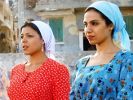Eye For Film >> Movies >> Scheherazade, Tell Me A Story (2009) Film Review
What do you look for from a trip to the cinema? Something to make you think? Something to make you question the way the world is? Or just a really good story?
Storytelling, as celebrated in the Arabian Nights by the tale of Scheherazade, is an ancient art. It is also particularly important in Middle Eastern culture as a means by which women have recorded their lives and given them meaning, often in contexts where they have been denied other forms of expression. It's worth remembering that Scheherazade herself was telling stories to stay alive - her husband could never bear to have her executed, like his previous wives, because then he wouldn't know what happened next - and gradually this led him to understand how valuable she was in her own right.

How much have those ancient customs really changed? Mona Zaki is Hebba, a modern day storyteller. Her stories are so explosive, rooted as they are in exposés of political corruption, that her husband (Mahmoud Hemida) asks her to tone them down so she doesn't jeopardise his chances of a successful career as a newspaper editor. Can't she concentrate on something softer for a while? How about moving from politics to women's issues? The problem, of course, is that everything is eventually political, and women's stories reveal some of the very worst of the corruption endemic in Egyptian society.
There are lots of issues here. How far should Hebba go in sacrificing her career for her husband's, and can they make their relationship work despite the stress this causes? Is it appropriate for such a privileged woman to make her living sensationalising the stories of the poor and vulnerable, or is she in fact more like them than she realises? Can the divisions in society ever be represented fairly through the gloss of the media machine? The problem is that Scheherazade, Tell Me A Story doesn't have the neutral starting point necessary to tell this tale effectively. It is ultimately a product of that machine itself, and it's just a bit too glossy to convince.
Within this film there are a number of stories, snapshots of Egyptian life framed by the story of Hebba herself, but they're all much more stylised than is at first apparent, so that they come to feel more like parables than real life tales. That vital edge is lost. The film is stunningly photographed and absorbing to the eye throughout (as is the elfin Zaki, no matter the implicit criticisms and comedy surrounding her appearance), but it's too polished to be truly challenging. It also suffers as a result of the slightly stagy acting style currently fashionable in Egyptian cinema. This Scheherazade still seems to be telling stories that centre on pleasing someone else. When will we hear her own voice?
Reviewed on: 02 Mar 2010
















